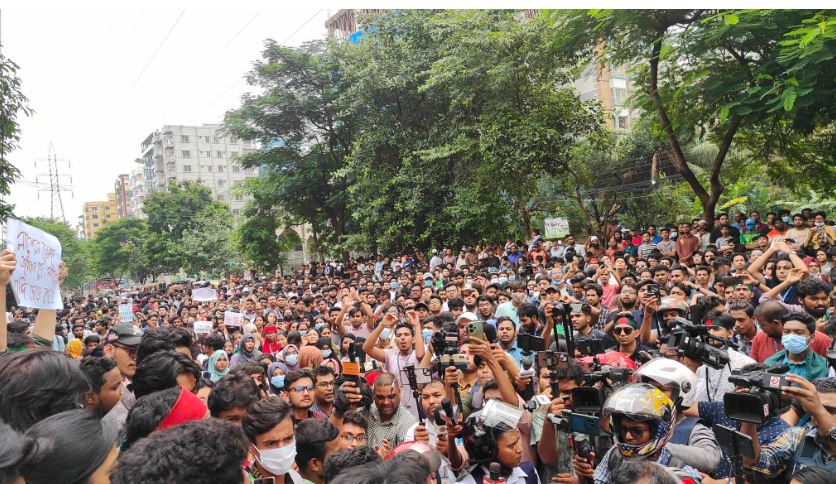
Student protests in Bangladesh have entered into a new phase with more
violence and new demands. Currently, the protesting students announced
they had a single demand — the resignation of Hasina and her
administration.
Thousands of people protested peacefully in Bangladesh’s capital, recently
demanding justice for more than 200 students and others killed during
protests last month. The protesters chanted anti-government slogans and
demanded the resignation of the prime minister as the wave of protest
widened beyond students to include people from many walks of life.
In Bangladesh, the students, frustrated by shortages of good jobs, have
been demanding an end to a quota that reserved 30% of government jobs
for relatives of veterans who fought in Bangladesh’s war of independence
in 1971. The government previously halted it in 2018 following mass
student protests, but in June, Bangladesh’s High Court reinstated the
quotas and set off a new round of protests.
Ruling on an appeal, the Supreme Court ordered that the veterans’ quota
be cut to 5%, with 93% of jobs to be allocated on merit. The remaining 2%
will be set aside for members of ethnic minorities and transgender and
disabled people. Even after the Supreme Court cut the veterans’ quota to
5% on July 21, protests have continued to spread amid outrage over the
violence.
Since 2014, Awami League Party in Bangladesh has been ruling the nation
without opposition in the Parliament. When there are no oppositions in the
Parliament, it is natural for the ruling party to be more autocratic and it runs
the nation with its one sided decisions. In such circumstances, there could
be no parameters to judge whether the government is making right or
wrong decisions.
Germany’s Bertelsmann Foundation published its “Transformation Index
2018 (BTI),” and 58 out of 129 developing nations have been rated as
autocracies. Bangladesh, Lebanon, Mozambique, Nicaragua, and Uganda
are considered by Bertelsmann to be “new” autocracies. Bangladesh’s
ruling Awami League Party has rejected the study as baseless. However,
the main opposition party, the Bangladesh Nationalist Party (BNP), claimed
that the report reflects the true nature of Bangladesh’s current political
climate.
In Bangladesh after boycotting the 2014 general election, the main
opposition party Bangladesh Nationalist Party (BNP) is absent in the
parliament. The primary reason given by the BNP for not contesting the
2014 elections was the abrogation by the Awami League-led government in
2011 of a constitutional provision enacted in 1998 that allowed for a
caretaker government to take the reins of the state in the run-up to the
elections. The caretaker government was meant to ensure free and fair
elections, this provision of the constitution scrapped by two-thirds majority
government of the Awami League. In the name of the two-thirds majority,
the scrapping of the constitution provision of caretaker government by
Awami League was the primary cause of an election boycott by the BNP.
Both the Awami League and BNP have a strong legacy with the democracy
and development of Bangladesh. However, after strong differences and
conflicts between them, the country has been suffering badly for a long
time. Bangladesh Awami League party under the leadership of Sheikh
Mujibur Rahman, the founding father of Bangladesh, led the struggle for
independence, first through massive populist and civil disobedience
movements, such as the Six Point Movement and 1971 Non-Cooperation
Movement, and then during the Bangladesh Liberation War.
After the emergence of independent Bangladesh, the Awami League won
the first general elections in 1973 but was overthrown in 1975 after the
assassination of Sheikh Mujibur Rahman. Subsequent military regimes
forced the party onto the political sidelines, and many of its senior leaders
and activists were executed and jailed. After the restoration of democracy
in 1990, the Awami League emerged as one of the principal players of
Bangladeshi politics.
Bangladesh Nationalist Party (BNP) was founded on 1 September 1978 by
former Bangladesh President Ziaur Rahman after the Presidential election
of 1978, intending to uniting the people with a nationalist ideology of the
country. Since then, the BNP won the second, fifth, sixth and eighth
national elections and two Presidential elections in 1978 and 1981. The
party also holds the record of being the most significant opposition in the
history of parliamentary elections. However, it does not currently have
representation in parliament after boycotting since the 2014 national
election. And one of the major causes of violent protest of students is the
inability and overconfidence of the government to tackle the situation
before it had been worse and it compared students with the opposition
parties, which is quiet in the Parliament.
The prospects for compromise with the students are rapidly diminishing, as
the protests and violations turn out to be continually more deep-rooted. The
protests have become a major challenge for Hasina, who returned to power
for a fourth consecutive term in January in an election boycotted by her
main opponents. Prime Minister Sheikh Hasina on offered to talk with
student leaders, but a coordinator refused in a Facebook post. Hasina and
other Cabinet ministers had earlier blamed the main opposition Bangladesh
Nationalist Party and now-banned right-wing Jamaat-e-Islami party and its
student wing for intruding into the student protests and committing violence.
Both the parties have denied the allegations. The situation in Bangladesh is
so tense about the future course of the country as it is uncertain and the
situation is going to be worse with more protests and violations, if the
government fails to negotiate with the students.
